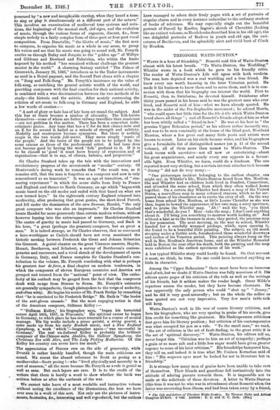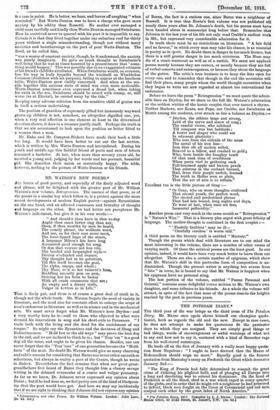THEODORE WATTS-DUNTON.* " Warm is a hero of friendship." Rossetti
said this of Watts-Duntoss almost with his latest breath. "To Watts-Dunton, the Worldling," Whistler wrote in a book which he gave to his friendly critio. The reader of Watts-Dunton's Life will agree with both verdicts. The man here depicted was a real worldling and a true friend. He knew every one worth knowing in the later Victorian period. He made it his business to know them and to serve them, and it is in con- nexion with them that his biography can interest the world. First to Rossetti, then to Swinburne, ho devoted himself. Swinburno after thirty years passed in his house said he was the greatest man who ever lived, and Rossetti said of him—what wo have already quoted. He was in the midst of the Pre-Raphaelite movement ; he adored Morris.
" who could spare but little time for the ttle-ei -tele which Watts-Dint= loved above all things " ; and all Rossetti's friends adopted him as what has been wittily called a " friend-in-law." Ho was at his best in " the genuine Upper Bohemian period," as his editors rather inexactly say. and was to be seen constantly at the house of the blind poet, Westland Marston, where a few great and many little poets and artists were known to resort. Later on his circle became wider, and his biographers give a formidable list of distinguished names (on p. 11 of the second volume), all of them more than names to Watts-Dunton. The book teems with anecdotes—not all now or entertaining—about his groat acquaintance, and nearly every one appears in a favour- able light. Even Whistler, we learn, could do a kindness. The one reported is not very striking, but a certain interest attaches to it because " Jimmy " did not do very many:- " One pioturescre incident belonging to the earliest chapter, one might say, in Whistler's life, Watts-Dunton heard from Mrs. Moulton. She and Whistler had as children both lived in Pomfret, Connecticut, and attended the same school, from which they often walked home together. On a certain day Whistler had drawn a map of the United States, a marvellous map in many coloured crayons, which so far sur- passed those of his classmates as to excite the envy of all. On the way home from school Mrs. Moulton, or little Louise Chandler as she was then, began to bewail the appearance of her own map, a sorry specimen. and to praise the Whistler map. I ' said the boy, you think that's wonderful, do you ? Here—take the map ; I don't mire anything about it. I'll bring you something to-morrow worth looking at.' And without a hint as to the treasure in store, they parted, the precious map in her possession. The next morning, on the way to school, Whistler handed her a carefully wrapped package, which, upon opening it, she found to be is beautiful little painting. The subject, an old monk stooping under a Gothic aroh, foreshadowed those wonderful doorways and arches of his Venetian period. This painting always hung on the wall in Mrs. Moulton's American home, and at the Whistler Memorial held in Boston the year after his death, both the painting and the map were exhibited as the earliest specimens of his work."
A less typical-Whistler story could hardly be found. On that account it must, we think, be true. No one could have invented anything so little in character.
Among the "Upper Bohemians" there must have been an immense deal of wit, but we doubt if Watts-Dant= was fully conscious of it. His editors quote pages of his criticism of the talk as well as the writings of his friends, but it seldom makes the reader laugh. Oscar Wilde's repartees amuse the 'reader, but they have become chestnuts. He was apparently the only person who could " shut up " " Jimmy," and he did it very good-naturedly ; but on the whole the sallies as here quoted are not very impressive. Very few men's table-talk will keep.
Watts-Dunton's work in life was of course literary criticism, and here his biographers, who are very sparing in praise of his novels, give him credit for something like greatness. His Shakespearean criticisms first gave him his literary position ; but criticism of his contemporaries was what occupied his pen as a rule. " To the small man," we rend, " the art of criticism is the art of fault-finding, to the great critic it is the art of ' spiritual discovery.'" Watts-Dunton, his editors tell -us, never forgot this. "Criticism was to him an act of sympathy; perhaps a grain or so more salt and a little less sugar would have given greater cogency to some of his later criticism." His friendships hampered him, they tell us, and indeed it is true what Mr. Coulson Kernahan said of him : "His magnum opus must be looked for not in literature but in friendship."
It is strange how many men of genius have been unable to take care of themselves. Their friends and guardians fall instinctively into the attitude of adoring parents towards them. It is impossible not to smile at the solicitude of these devotees. A letter to Watts-Dunton (this time it was not ho who was in attendance) about Rossetti when the latter was recovering from illness, and had been taken away by a friend,
• The Life an:114414n of Theodore Watts-Duntm. By Thomas Hake and Arthur Compton-Efekett. 2"40111. London : T. C. and B. C. Jack. Ws.] is a case in point. He is better, we hear, and leaves off coughing " when reminded." But Watts.Dunton was to have a charge who gave more anxiety by his oddity than Rossetti. No mother ever managed a child more tactfully and kindly than Watts-Dunton managed Swinburne. How ho contrived never to quarrel with his poet it is impossible to say. Certain it is that they lived together under one suburban roof for thirty years without a single misunderstanding, though not without many anxieties and heartburnings on the part of poor Watts.Dunton. The Bard, as he called him,
"was a source of constant anxiety, though, be it understood, the anxiety was purely imaginary. Ho gave so much thought to Swinburne's well-being that he was at times haunted by a presentiment that some- thing would happen.' This was possibly due to an exaggerated estimate of his friend's childlike attributes. When Swinburne would, on occasion, lose his way in leafy bypaths beyond the windmill on Wimbledon Common (doubtless with set purpose), failing to appear at the luncheon teble, Watts-Dunton grew visibly concerned. And when at the sea. eido together this anxious state of mind was even more noticeable. Watts-Dunton sometimes even expressed a dread lest, when taking his swim in the sea, Swinburne should be seized with cramp, or, still worse (as at Etretat), be carried away by the tide."
Keeping away adverse criticism from the sensitive child of genius was in itself a serious undertaking.
The position of guardian of supremely gifted but immensely wayward grown-up children is not, somehow, an altogether dignified one, yet, when a very real affection is one clement at least in the determined devotion shown, it does in a measure justify itself. Perhaps the truth is that we are accustomed to look upon the position as better fitted to a woman than a man.
Mr. Hake and Mr. Compton Rickett have made their book a little too long. It would have been bettor to cut out the last section, which is written by Mrs. Watts-Dunton and interpolated. During his youth and middle age this faithful friend of poets and men of letters remained a bachelor. At last, when more than seventy years old, he married a young and, judging by her words and her portrait, beautiful girl. She describes their union as ecstatically happy. She adds, however, nothing to the picture of Watts-Dunton or his friends.



































 Previous page
Previous page